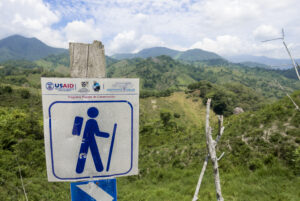Monday's meeting between U.S. President Barack Obama and his Colombian counterpart, Alvaro Uribe, marks a shift in U.S. foreign policy towards Colombia, with a greater focus on human rights.
"We are pleased that President Obama voiced concerns about the intelligence scandal, the continuing practice of extrajudicial executions and the possibility of President Uribe running for a third term in office," said Kelly Nicholls, Executive Director, U.S. Office on Colombia. "U.S. and Colombian human rights organizations greatly welcome President Obama's public support for labor and civil rights leaders and his focus on the importance of the rule of law and transparency."
President Obama expressed his polite displeasure at the possibility of the Colombian President amending the Colombian Constitution to run for a third term in office when he said, "our experience in the United States is that two terms works for us and that after eight years usually the American people want a change."
Indeed, a second re-election would pose a serious threat to the checks and balances necessary for a healthy democracy. President Uribe would be able to appoint political allies to the directorship of all autonomous state control institutions. This includes; most judges on the Supreme Court and Constitutional Court, the Attorney-General, the Inspector-General, the Human Rights Ombudsman, the Comptroller-General, the Central Bank, and the Broadcasting Board.
President Obama also said that the U.S. would work with Colombia so as to move forward on the U.S.-Colombia Free Trade Agreement. Our organizations stress that Colombia must make real improvements in human rights before any trade agreement can be discussed. This should include; addressing impunity in cases of violence against trade unionists and other human rights cases, strengthening respect for labor rights, and fully dealing with the para-politics scandal and the remobilization of paramilitary groups.
At a presentation yesterday, President Uribe said that building confidence in Colombia was a central focus for his government. However, the intelligence scandal, which President Obama addressed in the meeting between the two leaders, does little to generate confidence.
Evidence continues to emerge that for seven years, Mr. Uribe's presidential intelligence agency (DAS) engaged in illegal wiretaps and surveillance of hundreds of human rights defenders, journalists, labor leaders, opposition politicians, and Supreme Court judges. The presidential agency spied on their families, and even international and U.S.-based human rights organizations.
In yesterday's presentation, President Uribe also expressed his government's deep concern for the protection of trade unionists. However, if this is the case, says Lisa Haugaard, Executive Director, Latin America Working Group, "Why do President Uribe and his senior advisors continue to stigmatize union leaders and other human rights defenders as guerrilla sympathizers, and why are threats against such leaders not effectively investigated?"
Finally, President Uribe rightly noted in his presentation today that housing is a major issue for Colombia's more than 4 million internally displaced civilians. However, housing is only one of a multitude of basic services that the Colombian authorities are failing to provide, despite obligations under national and international law.
"Colombian authorities are failing to provide adequate prevention and protection programs, as can be seen in the 24 per cent increase in displacement in 2008 from the previous year and the surge in attacks against IDP leaders," said Gimena Sánchez Garzoli, Senior Associate for Colombia, Washington Office on Colombia. "The Colombian government only began to take steps to address this grave humanitarian crisis after its Constitutional Court issued multiple rulings ordering the government to do so."
XXX
For further information contact:
- Kelly Nicholls, U.S. Office on Colombia, (202) 232 8090, kelly@usofficeoncolombia.org
- Gimena Sánchez Garzoli, Washington Office on Latin America, (202) 797-2171, GSanchez@wola.org
- Lisa Haugaard, Latin America Working Group, (202) 546 7010, lisah@lawg.org

